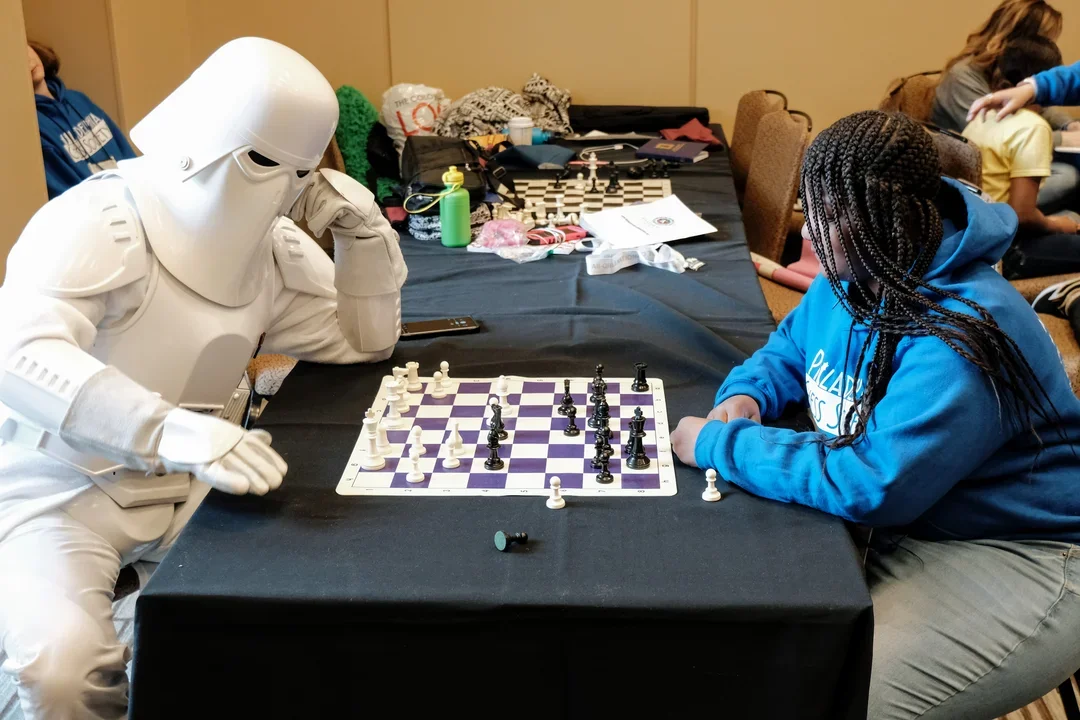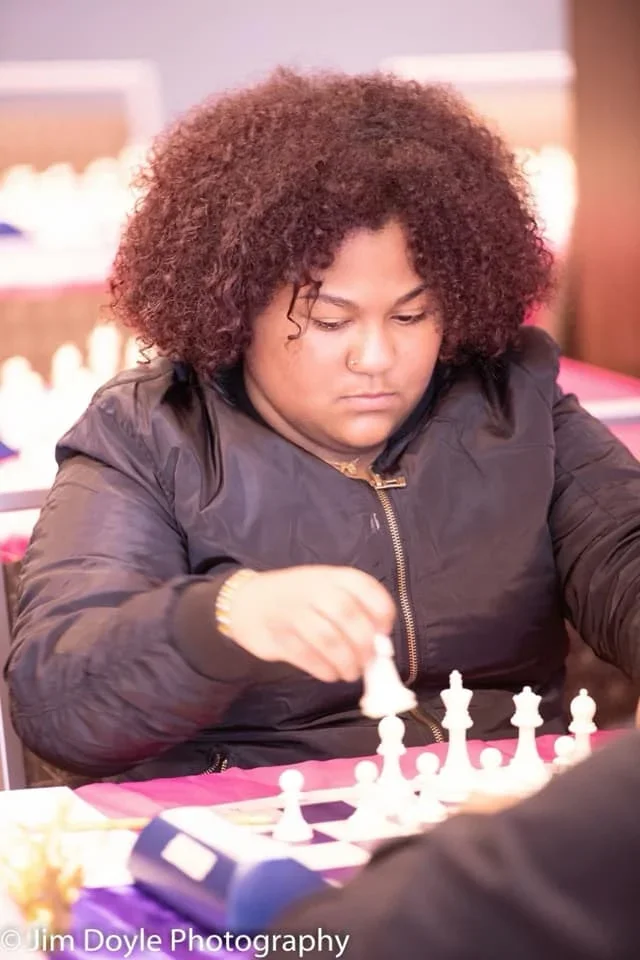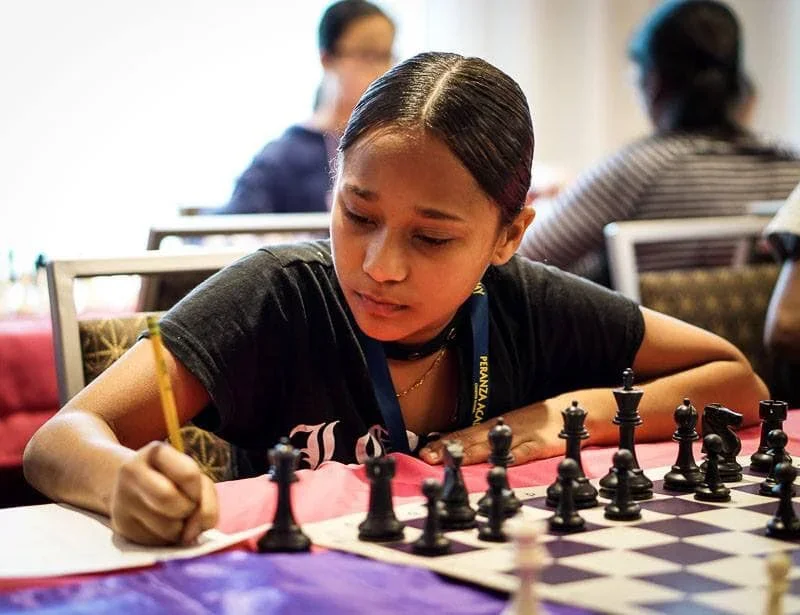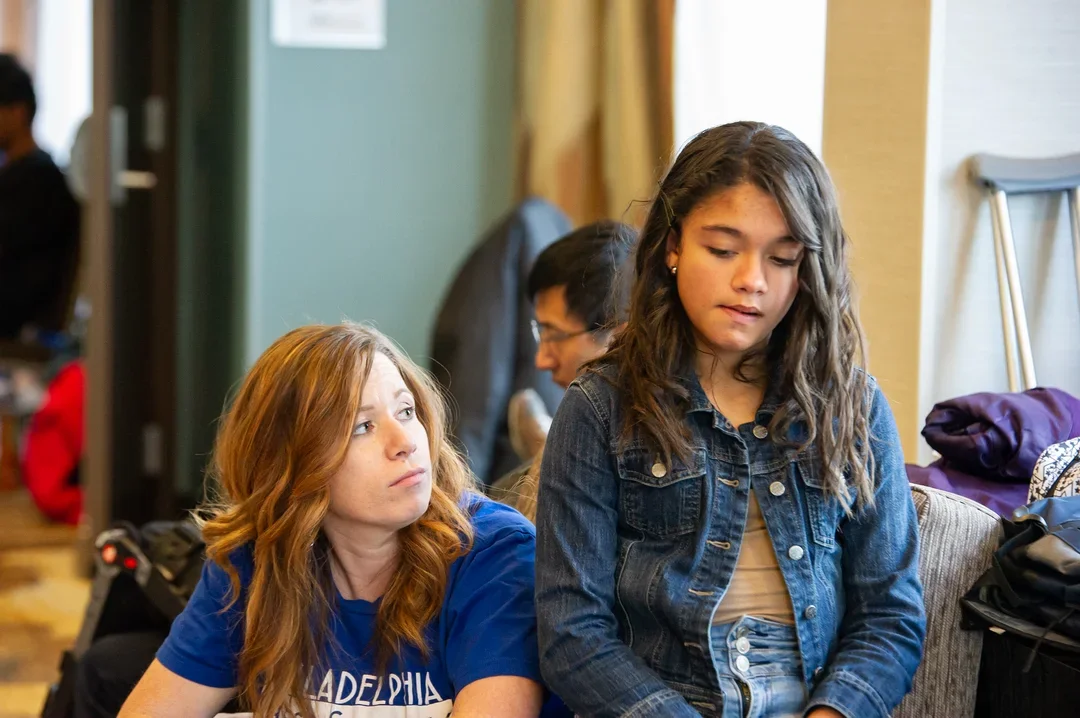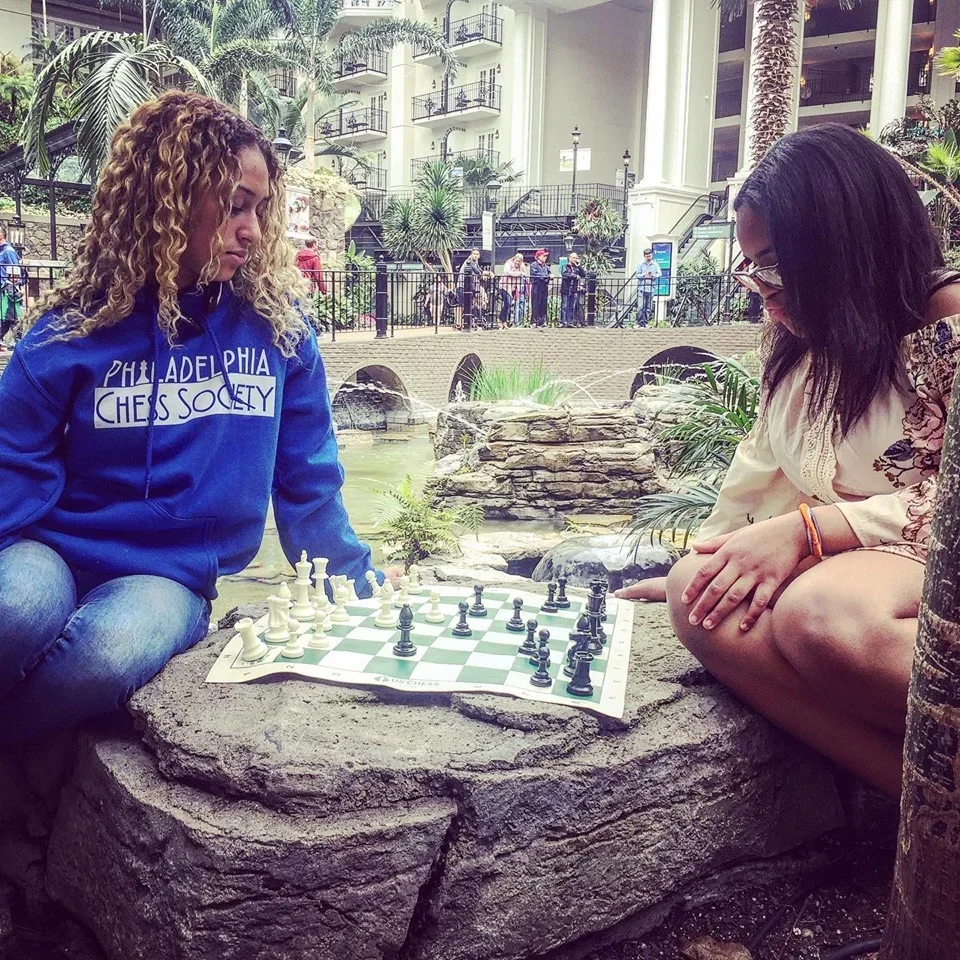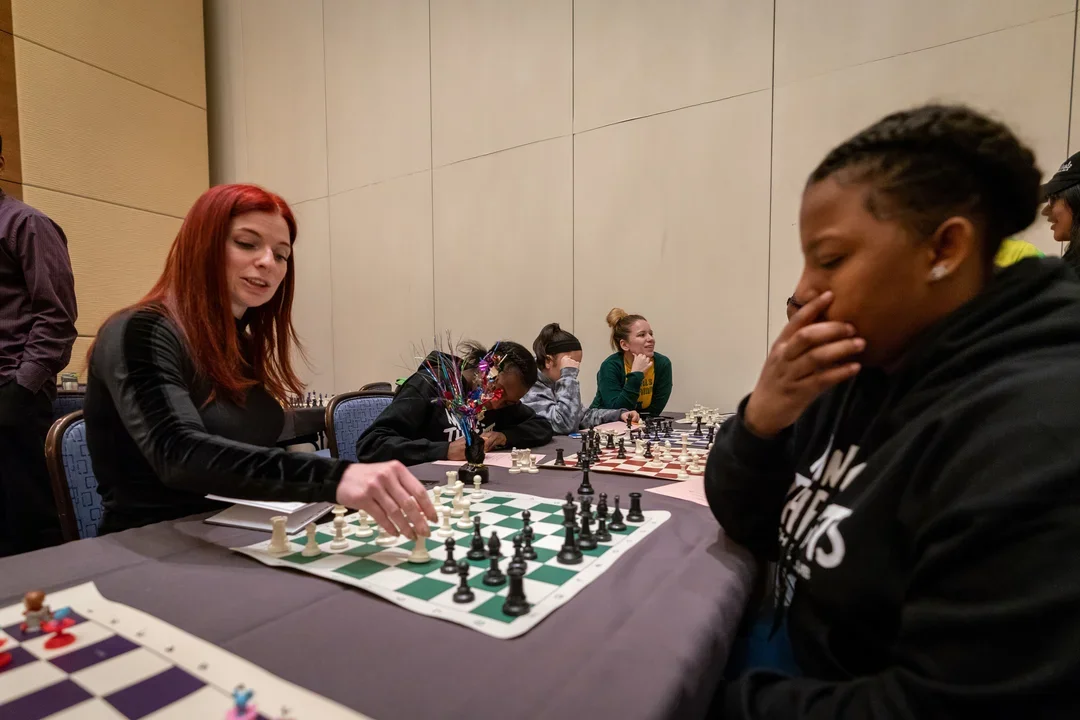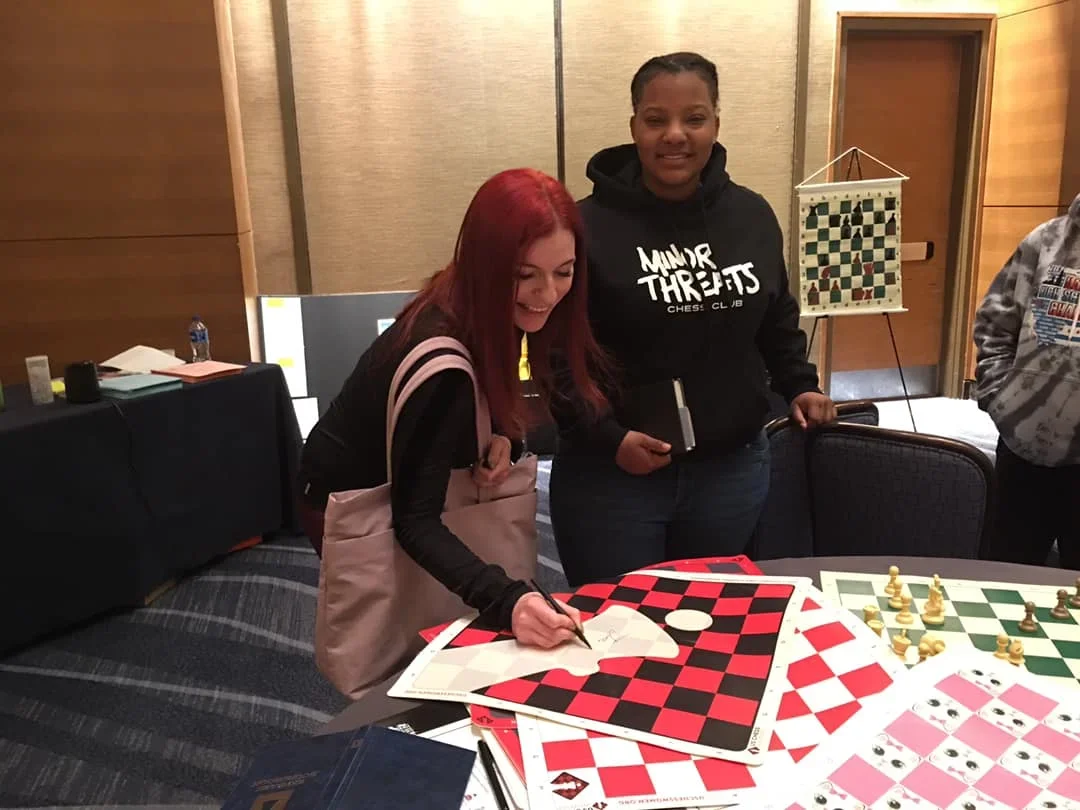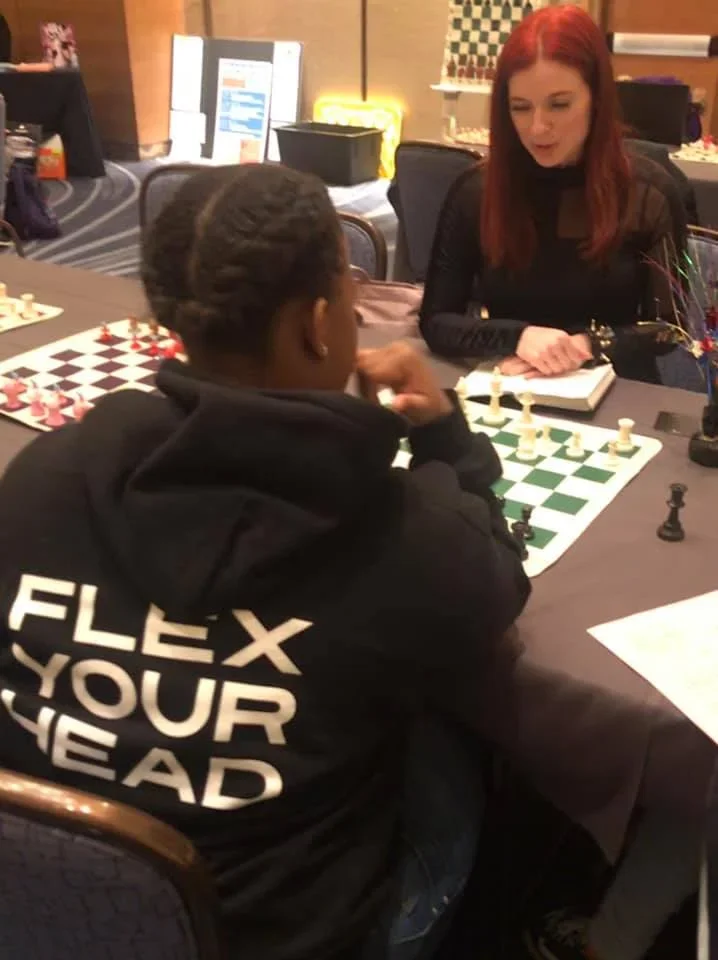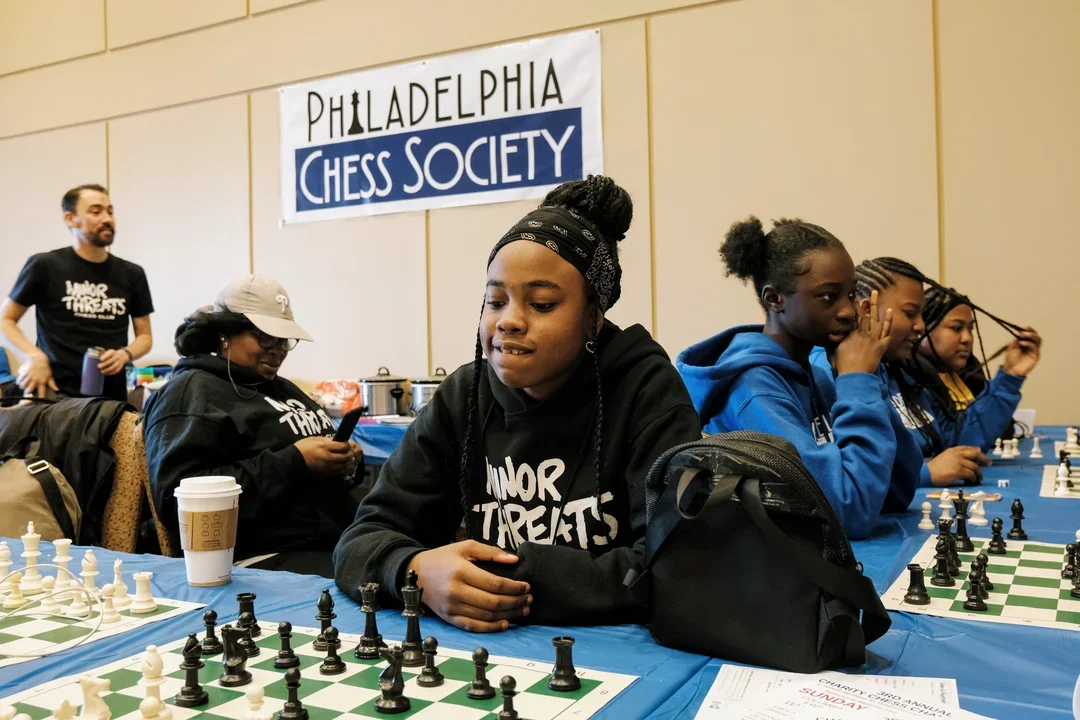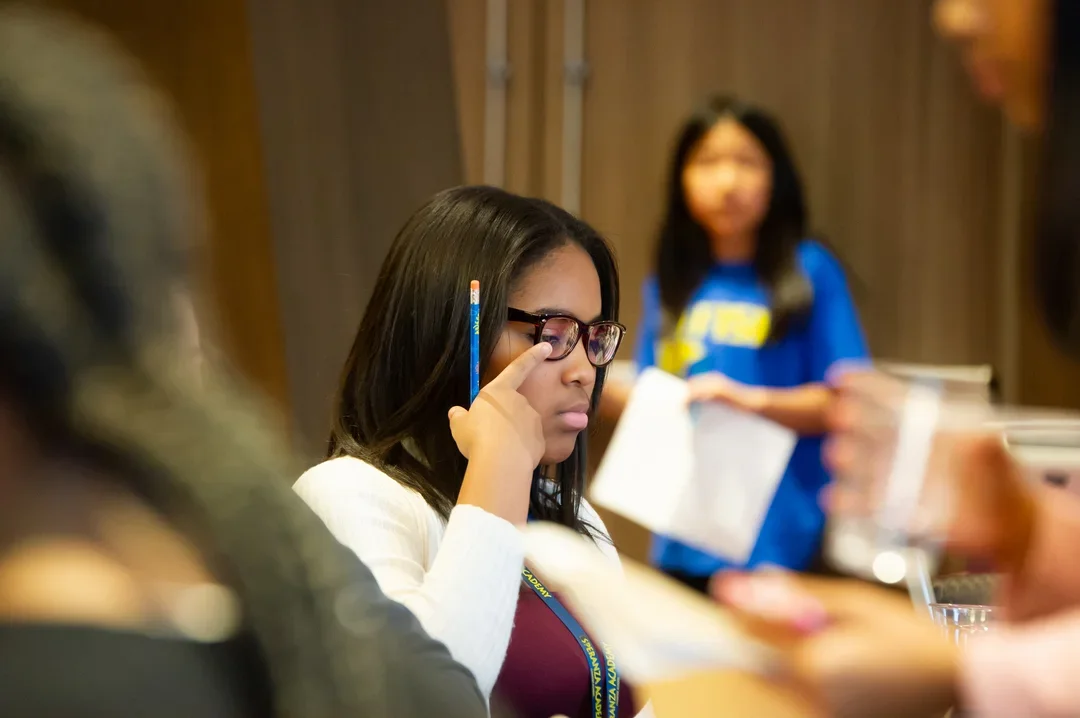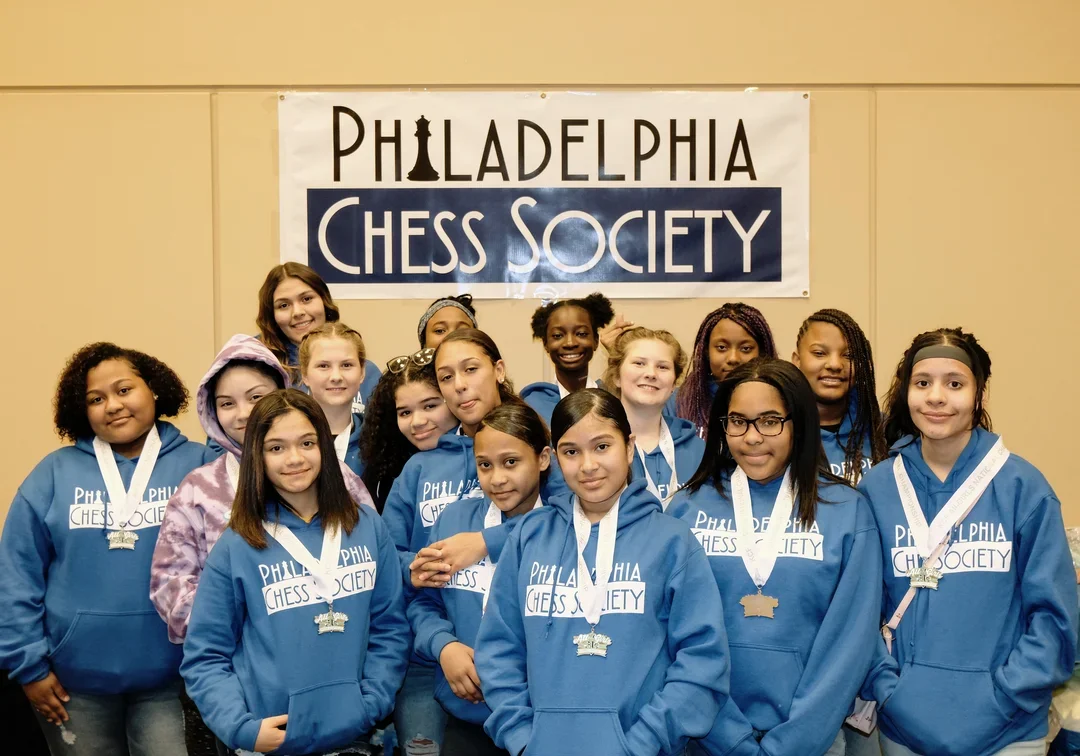Grasping two hot, identically black coffees, Coach Jason Bui and I are staring in silence at the pink, 5th round pairing chart for the U18 section of the 2019 KCF All-Girls National Championship. Despite the fact that it’s 7:30 and the Chicago dawn has just wearily begun its crawl through the windows of the McCormick Convention Center, we are both standing in the deserted hallway eager to analyze the morning’s line up. Even though our two teams are in competition with each other, we share many things in common: Both of us have one of the very few, large teams of older girls at the tournament, perhaps in the country - the drop off age for girls in chess is around 13. Bui has a team from S. Weir Mitchell School and a student from Parkway West, and I have teams from Esperanza Academy Middle and High School. We also both arrived on the same bus two days ago from Philadelphia, having tried to sleep on the 13 hour, overnight trip. And, even though we coach chess at different schools on opposite ends of the city, we are both board members of the Philadelphia Chess Society (PCS), who raised the money, chartered the bus, and arranged to get the girls, along with other Philly teams, here together. Last night was also a late night for both of us. It was 10:30 pm when I went to retrieve a chess board from the skittles room and found Coach Bui engaged in a frustrated discussion about his girls’ 4th round. They were games they should have won.
Meanwhile in the hotel rooms, I had been dealing with tears. Two of my girls separately had to cope with upsetting news from home. It had come at exactly the wrong time. To top it off, a tough loss in the 3rd round for one of my more competitive girls led to a complete shutdown. I didn’t feel I handled either situation well. It was after midnight before everyone was asleep. As we walked away from the charts to wake the girls for the 9 am round, we started back up a conversation we had frequently, “Is successfully coaching girls in chess different than coaching boys? And, if so, how is it done best?” Research on coaching girls in chess doesn’t really exist. However, a good deal of research is present for coaching, coaching young women, and supporting underrepresented groups in sports and the arts. A review yields useable information for chess coaches. And, as it turns out, good coaching for girls is exactly the same as, well, good coaching. However, it should be noted that because girls are underrepresented, a minority group, they inherently face an increased number of obstacles and challenges in a chess environment that others do not. And so, that “good” coaching becomes even more important and must be more intentionally implemented.
An excellent example is Angelika, soon to be sixteen, who also attended the Elementary Chess Championships in Nashville as an Assistant Coach. She is a bright, motivated student both in the classroom and over the board who, as a young Latina woman, faces obstacles many of us wouldn’t even consider; “I wanted to drop-out of high school because of things that were going on. I stayed because of chess. So long as I can stay part of chess, I’ll be able to keep my head up.” Even if chess is not yet the equal playing field we imagine it should be, we know the benefits of it are very real for everyone. So, how do we keep girls’ “heads up” so they can reap the benefits of chess? Issues surrounding self-esteem and confidence play a major role when coaching girls. The current culture of chess numerically places women as the lesser competitors (only 14% of chess players are female). To increase confidence in girls, studies claim that, in general, supportive relationships, opportunities to belong, positive social norms, and a feeling of safety and mattering create the environment for female confidence. For example, when girls were able to relate to their teams as a family, it was a sign of self-esteem. During All-Girls Nationals, Vanessa, a 12 year-old, new addition to the chess team said, “Getting to spend time with my chess family was my favorite moment. Playing as a girl now, I feel more confident.” Angelika added, “My favorite memory is the support from the other girls, and the girls that I supported. I feel more confident now after attending All-Girls Nationals. I feel more like part of it; I feel like I fit in.” Girls must be intentionally given space and relationships so that they feel as though chess is a place for them. The Girls Rooms hosted by the US Chess Women’s Committee at National Scholastic Championships is an excellent example of creating space. When Kayla, Coach Bui’s 9th grade scholastic player, was able to have WGM Jennifer Shahade analyze her game in the Girls Room at the 2019 High School National Championship, there was a change in her. Every round thereafter, Kayla could be found in the Girls Room immediately after her game ended, excitedly waiting to show Jen her win or loss.
At All-Girls Nationals Kayla’s words were confident and direct, “Playing a boy, I am more determined to win. A boy’s friends will say, ‘oh you lost to a girl?’ or, ‘Oh, you’re going to win this, it’s a girl.’ That last one was in my third round at High School Nationals. He lost. That’s why I like chess. When you find a good move and your opponent doesn’t see it, or they see it, but can’t stop it, it’s like ‘ahh.’” Intentionally focusing on the existence of confidence factors is essential; simply claiming they exist isn’t enough. As a female chess coach myself, and one with nearly half my club team being female, I thought I had created this environment simply by the numbers and my gender. However, I was floored when Natasha, 14, said recently about my creation of all-girls chess practices, “In [girls] club, you don’t have to worry about boys coming to the teacher and taking the attention away from you. Sometimes when you want to look over a game, or you want to ask a question and you want to listen to the answer without interruption - or while you’re talking - having boys around makes that difficult.” I had no idea that was happening in the co-ed practice space. Paola, who just turned 12, was a little more direct about the problem, “I feel like boys take over all the time. I feel like sometimes we should get our own tournaments and we should get to take over all the time.” Since hearing this, my girls-only practice will continue to exist, even more intentionally, as will the trips to all-girls tournaments. More than just environment, the way we teach girls the game of chess can affect their self-confidence. Studies on coaching show that self-referenced improvement is essential. This can be accomplished through incremental goal setting. Vanessa didn’t win many of her games at All-Girls Nationals, but she was happy with her performance and eager to get back to studying. We had set small goals for her in each game - remembering to develop minor pieces, making good trades, seeing tactics we had been working on, extending her time thinking about each move. The attainment of these small goals, even though she lost the game, directly showed Vanessa her effort in study and practice was working, thus building her confidence in her own ability to improve. This is important.
It definitely matters to girls in chess, not what gender you are as a coach, but the style in which you lead as a coach. In addition to high levels of training and instruction in chess, coaches who will be successful must strike a balance between encouraging learning and encouraging performance over the board - research shows both are important. Feedback given in game analysis or puzzle solving should be contingent on the task, appropriate to the situation and learning level, and, most importantly, positive. In fifth round of the U18 that morning, one of Coach Bui’s students, Brooklyn’e was paired against a student from Esperanza, Daiana. The game went almost to the full time control. When the girls came out of the round, we all sat down together to review the game. Coach Angelo DelloMargio of Esperanza provided incredible analysis of the game that left both girls feeling positive and collaborative about their efforts.
[pgn] [Event "All Girls Nationals"] [Site "http://gameknot.com/"] [Date "2019.05.02"] [Round "?"] [White "Brooklyne"] [Black "Daiana"] [Result "1-0"] [ECO "C50"] [Annotator "jensh"] [PlyCount "105"] [EventDate "2019.??.??"] [SourceVersionDate "2019.05.23"] 1. e4 e5 2. Nf3 Nc6 3. Bc4 Nf6 4. Nc3 Bc5 {The Two Knights Defense transposing into the Italian game.} 5. d3 h6 {Preventing Bg5} 6. Nd5 {Played a bit early, but not a huge mistake. Better is 6. 0-0 or 6. c3 - not necessarily needed here.} Nxd5 7. Bxd5 d6 8. h3 {Prevents ...Bg4, but neglects development and the fight for the center.} Bd7 9. a3 Qf6 {Brooklyn'e fights for the center and starts to bring pieces over for a king side attack! She may also castle queen side for extra firepower.} 10. O-O O-O-O 11. c3 Qg6 {The Q takes up an aggressive post against the White King with the threat of ...Bxh3} 12. b4 $1 { A great move, reacting with an attack on the queen side and indirectly thwarting ...Bxh3. It takes some accurate moves to prove this!} Bxh3 $2 { A mistake! Daiana now has a chance to capitalize on the loose Black Bishops.} 13. Nh4 {A strong move, attacking the queen and protecting the sensitive g2 square.} Bxf2+ {In a complicated position, Brooklyn'e fumbles a bit. The semi-open f-file benefits Daiana's game, and now Brooklyn'e's King may become a target. Also, this move assured the Queens come off, and White's defensive task becomes much easier.} 14. Rxf2 Qg4 15. Qxg4+ Bxg4 16. Rxf7 {White has broken through to the seventh rank where her pieces will put the black king under a lot of pressure.} g5 17. Ng6 Rhe8 18. b5 {Daiana takes the initiative and makes threats against Brooklyn'e's King and the queen side.} Nb8 19. b6 { As Daiana moves forward on the queen side, she spots the clever threat of 20... cxb6?? 21. Bxb7#! This move may also create targets to attack the Black camp and opens the queen side.} axb6 20. Be3 $1 {Following up with another threat to the b6 pawn, using the same mating idea twice!} Bh5 {Trying to take pressure off the king. If 21. Bxb6? Nd7! and Daiana will lose a piece!} 21. Ne7+ Kd7 22. Rh7 $1 {There is more to be gained than just repeating with 22. Ng6+ and 23. Rg7, as on 23. Rxh6 many pieces will be ripe for tactical assassination.} Rxe7 23. Rxh6 $5 {With two threats! Rxh5 and Bxg5 are both in the air, and it is time to pick the lesser of two evils.} Rg7 {The position is becoming hard to hold.} 24. Rxh5 Re7 $2 {A surprising mistake, although the position was already difficult.} 25. Bxg5 Rg7 26. Bxd8 c6 $1 {Still with some fight, Brooklyn'e recognizes that 26...Kxd8 is hopeless 27. Rh8+ is hopeless. This move keeps more fight in the position!} 27. Bf6 Rg3 28. Rh7+ Kc8 29. Be6+ Nd7 30. Bxd7+ Kc7 31. Be6+ {The game is effectively over. Daiana converts her advantage slowly, but still is sure to reel in the victory despite Brooklyn'e's counter punches.} Kb8 32. Rb1 Ka7 33. Kf2 Rxd3 34. c4 Rxa3 35. Bc8 Ra2+ 36. Kf1 Ka6 37. Bxb7+ Ka5 38. Rb5+ Ka4 39. Rxb6 Ra1+ 40. Kf2 Ra2+ 41. Kg1 Ra1+ 42. Kf2 Ka5 43. Ra6+ Kb4 44. Rxa1 Kxc4 45. Ba6+ Kd4 46. Rh4 c5 47. Rd1+ Kc3 48. Rh3+ Kb2 49. Rd2+ Kc1 50. Re2 Kd1 51. Rd3+ Kc1 52. Ra3 c4 53. Ra1# 1-0 [/pgn]
But what do you do when a game doesn’t go that well? It’s important for coaches of female chess players to create a democratic team atmosphere, where the players have a reasonable say and a voice that can be heard. This style of coaching should also support the autonomy of the girl to make decisions and steer the course of her chess learning and competitive life. In the sixth round, the last round of the tournament, Esperanza High School Daiana played Esperanza Middle School Daiana and an analysis of the game allowed both Daianas’ a voice in the review: [pgn] [Event "All Girls Nationals "] [Site "http://gameknot.com/"] [Date "2019.05.02"] [Round "?"] [White "Daiana"] [Black " Daiana"] [Result "0-1"] [ECO "C50"] [Annotator "jensh"] [PlyCount "82"] [EventDate "2019.??.??"] [SourceVersionDate "2019.05.23"] 1. e4 e5 2. Nf3 Nc6 3. Bc4 Bc5 {Right here I didn’t know what to do. Bishop c5. I just didn’t want c6} 4. Nc3 d6 5. a3 Nf6 6. d3 O-O 7. Nd5 h6 8. O-O Nxd5 {I took 5-10 minutes right here I didn’t know what I should do: move the pawn to d5 or take the knight with the bishop. Eventually she wasn’t going to let me come to the king side. But I took the knight.} 9. Bxd5 Ne7 10. d4 exd4 11. Nxd4 c6 12. Bc4 Ng6 13. Nf5 Bxf5 14. exf5 Ne5 15. Bd3 Qh4 {This is very aggressive. I’ve been aggressive this whole tournament.} 16. Be3 Bxe3 17. fxe3 {The f-file is open and Daiana has fixed her pawns.} Nxd3 {I took her Bishop and then Daiana took with her Queen.} 18. Qxd3 Rad8 19. Qd4 Qxd4 { She wanted to trade Queens and I was like, yeah, sure.} 20. exd4 c5 21. c3 cxd4 22. cxd4 g6 23. Rae1 Rfe8 24. Rc1 {Might be a mistake too} g5 25. g3 Re2 26. Rc7 Rxb2 27. a4 Re8 28. h4 g4 29. h5 Ree2 {Good move.} 30. Rc8+ {Omg} Kh7 31. Rf4 Re1+ 32. Rf1 Re3 33. Rf2 Rxg3+ 34. Kf1 Re3 35. Kg1 Rg3+ 36. Kf1 Rb1+ 37. Ke2 Ra3 38. Rf4 Rb2+ 39. Kd1 Rd3+ {That was all part of my plan.} 40. Ke1 g3 41. Kf1 {I forgot that the Rook was saving me and she checkmated me.} Rd1# 0-1[/pgn]
Lastly, in studies girls responded especially negatively to “ego climates,” coaching and team styles where winning was emphasized and the feeling of “we’re the best or better than everyone” was supported. Whereas boys responded positively to this coaching climate, it was only successful with boys when the team or player “won stuff.” It had a compounding negative effect when the boys didn’t. However, both boys and girls responded positively in all studies to a “mastery-oriented” style of coaching. In this mode of coaching, students are encouraged to set personal goals in chess, both over the board and in their social-emotional performance, that are scaffolded and step-by-step attainable. This stands in contrast to “win the game” and is more specific and personal. Studies show that the above reduced pre-performance anxiety and boosted self-confidence and belief in self-efficacy. Coaching boys’ chess is no different than coaching girls in chess. Good, research-supported coaching methods yield positive results. These methods just become more important, and need to be more intentional, when coaching girls. Female chess players are an underrepresented group facing increased challenges to success in chess. Angelie, 14 from Esperanza says:
“If a girl wanted to start playing chess, I would tell her don’t give up, don’t let people take you down. Don’t stop playing because a boy told you that you’re not good enough. I kept practicing and practicing until I told the boys to play me and they did. They were surprised at how good I was, and I was like, ‘yeah, what now?’”
At 8 pm that night, Coach Bui and I are again holding two identical, black coffees and staring in silence at the wintry mix that’s coming down over the windshield of the charter bus as it makes it way past the dark Chicago limits and towards the Philadelphia morning. In thirteen hours we will be home. In the overhead compartments of the bus are two trophies - a third place team finish in the U16 for Esperanza, and a third place team finish in the U18 for Mitchell. We are both competitive people and both would have wanted the first place titles in those sections. However, the words of our girls are in the silence as we look forward to the next Nationals and implementing more good coaching strategies in the coming year:
“I feel better now that I’m good at chess. I’m more confident.” - Angelie
“At first I felt like I didn’t have that much confidence, and I still don’t, but at the moment I believe in myself. I would tell any girl that, even if chess isn’t that popular, it will change your life. I love my team - they are like family.” - Lovelia
“I feel like, just because I play chess, I am the best. It gives you, no, it teaches you, how to be yourself and how to communicate with other people.” - Natasha
“I feel like I’m unstoppable.” - Brooklyn’e
Categories
Archives
- January 2026 (4)
- December 2025 (27)
- November 2025 (29)
- October 2025 (39)
- September 2025 (27)
- August 2025 (29)
- July 2025 (43)
- June 2025 (25)
- May 2025 (24)
- April 2025 (29)
- March 2025 (29)
- February 2025 (20)
- January 2025 (24)
- December 2024 (34)
- November 2024 (18)
- October 2024 (35)
- September 2024 (23)
- August 2024 (27)
- July 2024 (44)
- June 2024 (27)
- May 2024 (31)
- April 2024 (51)
- March 2024 (34)
- February 2024 (25)
- January 2024 (26)
- December 2023 (29)
- November 2023 (26)
- October 2023 (37)
- September 2023 (27)
- August 2023 (37)
- July 2023 (47)
- June 2023 (33)
- May 2023 (37)
- April 2023 (45)
- March 2023 (37)
- February 2023 (28)
- January 2023 (31)
- December 2022 (23)
- November 2022 (32)
- October 2022 (31)
- September 2022 (19)
- August 2022 (39)
- July 2022 (32)
- June 2022 (35)
- May 2022 (21)
- April 2022 (31)
- March 2022 (33)
- February 2022 (21)
- January 2022 (27)
- December 2021 (36)
- November 2021 (34)
- October 2021 (25)
- September 2021 (25)
- August 2021 (41)
- July 2021 (36)
- June 2021 (29)
- May 2021 (29)
- April 2021 (31)
- March 2021 (33)
- February 2021 (28)
- January 2021 (29)
- December 2020 (38)
- November 2020 (40)
- October 2020 (41)
- September 2020 (35)
- August 2020 (38)
- July 2020 (36)
- June 2020 (46)
- May 2020 (42)
- April 2020 (37)
- March 2020 (60)
- February 2020 (38)
- January 2020 (45)
- December 2019 (34)
- November 2019 (35)
- October 2019 (42)
- September 2019 (45)
- August 2019 (56)
- July 2019 (44)
- June 2019 (35)
- May 2019 (40)
- April 2019 (48)
- March 2019 (61)
- February 2019 (39)
- January 2019 (30)
- December 2018 (29)
- November 2018 (51)
- October 2018 (45)
- September 2018 (29)
- August 2018 (49)
- July 2018 (35)
- June 2018 (31)
- May 2018 (39)
- April 2018 (31)
- March 2018 (26)
- February 2018 (33)
- January 2018 (30)
- December 2017 (26)
- November 2017 (24)
- October 2017 (30)
- September 2017 (30)
- August 2017 (31)
- July 2017 (28)
- June 2017 (32)
- May 2017 (26)
- April 2017 (37)
- March 2017 (28)
- February 2017 (30)
- January 2017 (27)
- December 2016 (29)
- November 2016 (24)
- October 2016 (32)
- September 2016 (31)
- August 2016 (27)
- July 2016 (24)
- June 2016 (26)
- May 2016 (19)
- April 2016 (30)
- March 2016 (36)
- February 2016 (28)
- January 2016 (32)
- December 2015 (26)
- November 2015 (23)
- October 2015 (16)
- September 2015 (28)
- August 2015 (28)
- July 2015 (6)
- June 2015 (1)
- May 2015 (2)
- April 2015 (1)
- February 2015 (3)
- January 2015 (1)
- December 2014 (1)
- July 2010 (1)
- October 1991 (1)
- August 1989 (1)
- January 1988 (1)
- December 1983 (1)



